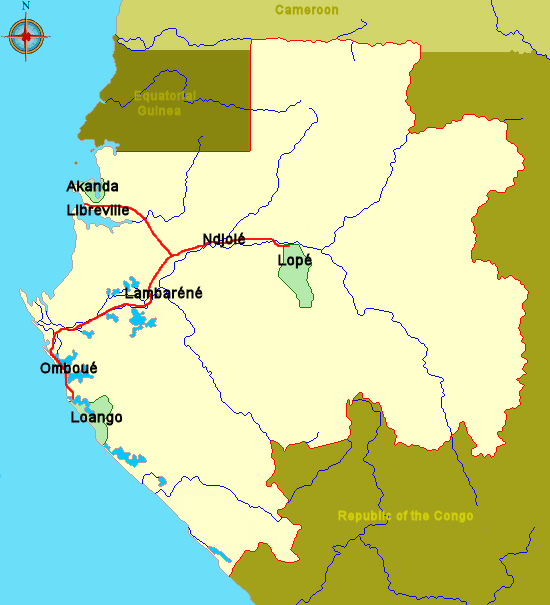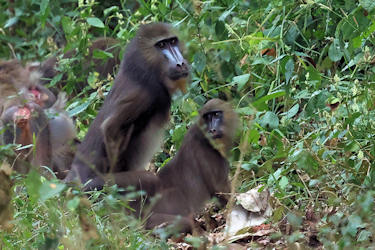Gabon

Historie
The African Pygmies are a group of ethnicities native to Central Africa, mostly the Congo Basin, traditionally subsisting
on a forager and hunter-gatherer lifestyle. Expansion to Central Africa by the ancestors of African Pygmies most likely took
place before 130.000 years ago, and certainly before 60.000 years ago. A commonly held belief is that African Pygmies are the
direct descendants of Late Stone Age hunter-gatherer peoples of the central African rainforest, who were partially
absorbed or displaced by later immigration of agricultural peoples.
The societies of the indigenous Pygmies were largely displaced from about AD 1000 onwards by migrating Bantu peoples
from the north, such as the Fang. Little is known of tribal life before European contact, but tribal art suggests a
rich cultural heritage.
Gabon's first confirmed European visitors were Portuguese explorers and traders who arrived in the late 15th century. The
Portuguese settled on the offshore islands of São Tomé, Príncipe, and Fernando Pó, but were regular visitors to the coast.
Between 1580 and 1600 the Dutch visited the coast near Port-Gentil to supply themselves. The VOC ship Mauritius,
which was on its way to Amsterdam from the Far East, sank here on March 19, 1609.
At this time, the southern coast was controlled by the Kingdom of Loango (c. 1550 – c. 1883). The English traveller
Andrew Battel, when he was there in about 1610, recorded that the predecessor of the unnamed king ruling at that time was
named "Gembe" (modernized as Njimbe), possibly the founder of the kingdom. With the death of King Buatu in
1787, the succession of leadership is uncertain.
The Kingdom of Orungu (c. 1700–1927) is named for its founders, the Orungu, a Myènè speaking people of unknown origin.
Most scholars believe they migrated into the Ogooué River delta in the early 17th century from the south. This is further backed
up by the fact that the Orungu seemed to have been heavily influenced by the Kingdom of Loango. During this period of migration,
the Orungu drove another Myènè speaking people, the Mpongwe, toward the Gabon Estuary in an effort to dominate trade with
Europeans. The scheme was successful, and a prosperous kingdom emerged at Cape Lopez.
The kingdom of Orungu developed a broker culture thanks to their position on the coast. In the 17th century, the Dutch dominated
the coastal trade and ivory was the major export. The Orungu were a metal-working and boatbuilding culture, which allowed them
to dominate the riverine trade. Through its control of the slave trade in the 18th and 19th centuries, it was able to
become the most powerful of the trading centers that developed in Gabon during that period.
The Mpongwe people gradually became the middlemen between the coast and the interior peoples such as the Bakèlè and Séké.
From about the 1770s, the Mpongwe also became involved in the slave trade. In the 1830s, Mpongwe trade consisted of
slaves, dyewood, ebony, rubber, ivory, and gum copal in exchange for cloth, iron, firearms, and various
forms of alcoholic drink.
In 1838 and 1841, France established a protectorate over the coastal regions of Gabon by treaties with Gabonese coastal
chiefs.
American missionaries from New England established a mission at the mouth of the Komo River in 1842. In 1849, the French
authorities captured an illegal slave ship and freed the captives on board. The captives were released near the mission station,
where they founded a settlement which was called Libreville. (French for "free town")
French explorers penetrated Gabon's dense jungles between 1862 and 1887. The most famous, Pierre Savorgnan de Brazza, used
Gabonese bearers and guides in his search for the headwaters of the Congo river. France occupied Gabon in 1885, but did not administer
it until 1903. In 1910 Gabon became one of the four territories of French Equatorial Africa. On 15 July 1960 France agreed
to Gabon becoming fully independent. On 17 August 1960 Gabon became an independent country.
The first president of Gabon, elected in 1961, was Léon M'ba, with Omar Bongo Ondimba as his vice president.
When M'Ba died in 1967, Bongo replaced him as president. In March 1968, Bongo declared Gabon a 1-party state by establishing a
new party – the Parti Démocratique Gabonais (PDG). He invited all Gabonese, regardless of previous political affiliation,
to participate. Bongo sought to forge a single national movement in support of the government's development policies, using PDG as
a tool to submerge the regional and tribal rivalries that had divided Gabonese politics in the past. Bongo was elected president in
February 1975; in April 1975, the position of vice president was abolished and replaced by the position of prime minister, who had
no right to automatic succession. Bongo was re-elected President in December 1979 and November 1986 to 7-year terms.
Following President Omar Bongo's re-election in December 1993 with 51% of the vote, opposition candidates refused to validate the
election results. Civil disturbances and violent repression led to an agreement between the government and opposition factions to work
toward a political settlement. These talks led to the Paris Accords in November 1994, under which some opposition figures
were included in a government of national unity.
On 8 June 2009, President Omar Bongo died of cardiac arrest at a Spanish hospital in Barcelona. In accordance with the amended
constitution, Rose Francine Rogombé, the President of the Senate, became Interim President on 10 June 2009. The first
contested elections in Gabon's history that did not include Omar Bongo as a candidate were held on 30 August 2009, with 18 candidates
for president. The lead-up to the elections saw some isolated protests. Omar Bongo's son, ruling party leader Ali Bongo, was
formally declared the winner after a 3-week review by the Constitutional Court; his inauguration took place on 16 October 2009.
In August 2023, following the announcement that Ali Bongo had won a third term in the general election, military officers announced
that they had taken power in a coup d'état and cancelled the election results. They also dissolved state institutions including
the Judiciary, Parliament and the constitutional assembly and named Gen Brice Oligui Nguema as the country's transitional leader.
On 4 September 2023, General Nguema was sworn in as interim president of Gabon.
I have visited Gabon in september 2024
These are the places where i have been
Libreville
Ndjolé
Parc National de la Lopé
Lambaréné
Omboué
Parc National de Loango
Parc National d'Akanda
Please let me know when you're having questions.
i would be pleased to help you.
Things to do and other tips
